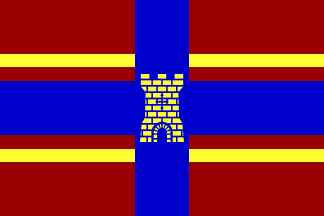 image by
Eugene Ipavec
image by
Eugene Ipavec
adopted on 13 July 1999

Last modified: 2024-01-20 by rob raeside
Keywords: coevorden | castle | dalen |
Links: FOTW homepage |
search |
disclaimer and copyright |
write us |
mirrors
 image by
Eugene Ipavec
image by
Eugene Ipavec
adopted on 13 July 1999
The merger took place on 1 Jan 1998, and the new flag was adopted on
13 July 1999.
Franc Van Diest, 24 February 2001.
The good people of Coevorden have a sense of detail as witness
this page presenting the municipal symbols,
that is to say, the tower's brickwork, mortared blue, appears in the actual
flag. Dimensions given: 1 m x 1.50 m. Flag (and arms) were designed by the
Drentsch Heraldisch College (Drenthe Heraldic College).
Additional information gleaned from the description:
while the cross appears in the arms, the main colours derive from the five
former municipalities' flags. The castle symbolizes the current municipal
centre and the four red rectangles, the former local centres. The yellow
stripes refer to the soil (sand), to the spear and staff, and - together with
the blue cross - to industrial activity. Furthermore the yellow stripes
represent roads and railway tracks; the blue cross also symbolizes local
waterways.
Jan Martens, 7 January 2011
![[Coevorden Coat of Arms]](../images/n/nl-dr)cv.jpg) image from the Coevorden municipal website.
image from the Coevorden municipal website.
Granted 18 August 2000. The scroll reads (in Latin): Multis Periculis Supersum
- Despite the many dangers which threatened me I still exist.
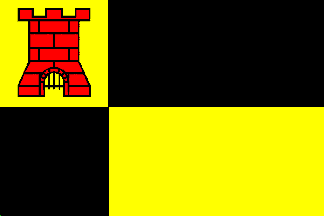 Shipmate Flagchart : http://www.flagchart.net
Shipmate Flagchart : http://www.flagchart.net
Adopted 2 September 1968
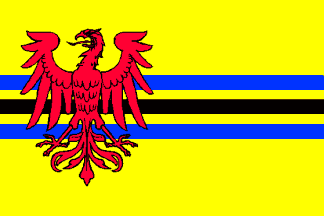 Shipmate Flagchart : http://www.flagchart.net
Shipmate Flagchart : http://www.flagchart.net
Description: seven stripes of yellow, blue, yellow, black, yellow, blue,
yellow, proportioned 5:1:1:1:1:1:5 with at ¼ flaglength a red heraldic
eagle of 3/4 flagheight.
![[Dalen village flag]](../images/n/nl-dr0dl.gif) Shipmate Flagchart : http://www.flagchart.net
Shipmate Flagchart : http://www.flagchart.net
How to make a village flag: Grab the old municipal flag, grab a tarbrush
and hey presto! Dalen is since 1999 part of the municipality of Coevorden
in Drenthe province. For 30 Euro one can buy the new village flag, see this
webpage.
Jarig Bakker, 8 October 2006
![[Dalen Coat of Arms]](../images/n/nl-dr)dl.gif) image by Jarig Bakker, 8 October 2006
image by Jarig Bakker, 8 October 2006
Description: I. Or and eagle gules; II. noir a chimney-hanger or.
The municipalities of Dalen and Schoonebeek used to belong to the Manor
of Coevorden; the red eagle was its symbol, and it also signifies that
Dalen and Schoonebeek formed once one municipality. Schoonebeek
has the same eagle in its arms. The fire- or chimney-hanger ("vuurhaal"
or "schoorsteenhaal" on the shield is derived from the arms of the
ten Holte family, which gave several mayors to this municipality. The "vuurhaal"
was used in many Drentse farmhouses, reminding of the Saxon influence on
the nature of Drenthe rural villages.
Source: this webpage.
Jarig Bakker, 8 Oct 2006
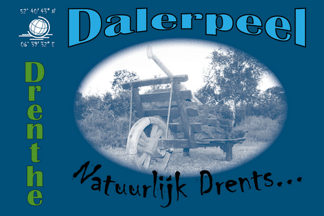 image located by Valentin Poposki, 16 December 2023
image located by Valentin Poposki, 16 December 2023
adopted 2011
https://www.facebook.com/Dalerpeel/photos/
https://www.facebook.com/Dalerpeel/photos/vlag-van-dalerpeel
Since 2011, Dalerpeel has had its own, officially recognized flag. This is designed with the features of Dalerpeel, a dark blue flag, with the name in light blue at top, the province in green down the hoist, a slogan in black across the bottom and in the center a black and white photograph of a hay wagon.
Valentin Poposki, 16 December 2023
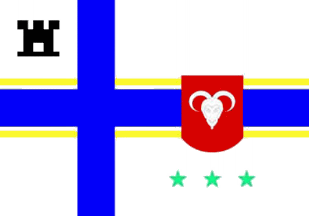 image located by Valentin Poposki, 16 December 2023
image located by Valentin Poposki, 16 December 2023
From https://www.mastenenvlaggen.nl/product/dorpsvlag-erm:
The flag of Erm has probably been in use in its current form since 2022. It is white and features a blue Scandinavian cross. A yellow line is included above and below the horizontal bar of this cross. In the canton at the top left is a black silhouette of a castle or fortress. On the right of the flag is a red shield with a goat's head on it. Below are three green five-pointed stars.
https://www.erm.nu/dorpsvlag-van-erm/
Valentin Poposki, 16 December 2023
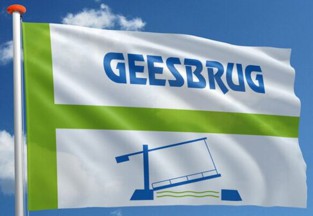 image located by Valentin Poposki, 16 December 2023
image located by Valentin Poposki, 16 December 2023
From https://www.mastenenvlaggen.nl/product/dorpsvlag-geesbrug:
The flag of Geesbrug (or Giesbrugge) is white and has a green vertical stripe at the hoist. A horizontal stripe in the same color extends across the middle of the flag. The village name in blue is above this stripe. Below the stripe is an opening bridge above water. This bridge is part of six bridges over the Verlengde Hoogeveense Vaart. The hamlet of Geesbrug was created at the westernmost bridge of this series after the Second World War.
Valentin Poposki, 16 December 2023
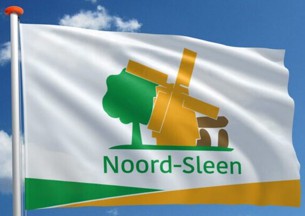 image located by Valentin Poposki, 16 December 2023
image located by Valentin Poposki, 16 December 2023
From https://www.mastenenvlaggen.nl/product/dorpsvlag-noord-sleen:
The flag of Noord-Sleen (or Noord-Slien) has been in use in its current form since 2019 and was presented during a local festival. The flag is white and shows the village logo in the center. This includes a green tree, a yellow mill, brown dolmen and the village name. The mill represents the local mill Albertdina. The tree probably stands in front of the forest near Noord-Sleen. The dolmen may be a reference to Dolmen D50 and D51.
Valentin Poposki, 16 December 2023
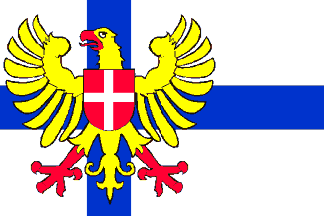 Shipmate Flagchart : http://www.flagchart.net
Shipmate Flagchart : http://www.flagchart.net
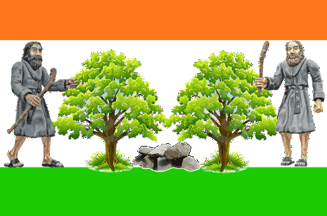 image located by Peter Hans van den Muijzenberg, 16 May 2021
image located by Peter Hans van den Muijzenberg, 16 May 2021
A flag can be seen at
https://www.schoonoord.nl/dorpsbelangen/dorpsvlag/. The advantage there at
least is that an origin is suggested, as the village is referred to as the
"Giant Village".
Peter Hans van den Muijzenberg, 16 May 2021
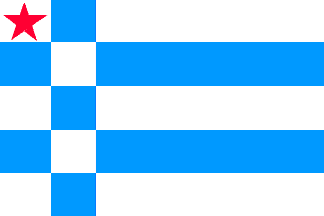 Shipmate Flagchart : http://www.flagchart.net
Shipmate Flagchart : http://www.flagchart.net
Sleen is now part of Coevorden in Drenthe, Netherlands.
The municipality of Sleen instituted a municipal flag by a resolution
of the municipal council of 25 June 1962. Description:
The flag is composed of five horizontal stripes of equal width, alternating
white and blue. To the hoist flanked by two vertical rows of five square
blocks, alternating white and blue too. The first block on the top has
a red five-pointed star, derived from the flag of Drente. In that flag
there are six stars, one for each 'dingspel' (old name for a municipality).
Sleen was the capital of the first dingspil "Het Zuidenveld".
Jarig Bakker, 2 August 1999.
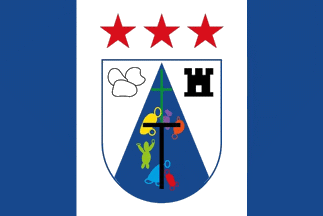 image located by Valentin Poposki, 16 December 2023
image located by Valentin Poposki, 16 December 2023
From https://www.mastenenvlaggen.nl/product/dorpsvlag-steenwijksmoer:
The flag of Steenwijksmoer has been in use in its current form since 2016 and was created in a design competition among children from a local primary school. The background of the flag consists of three vertical stripes in blue and white. In the
wider white stripe is the coat of arms with three red five-pointed stars above it. These stars refer to the province of Drenthe.
A silhouette of Coevorden castle is placed in the shield together with the stones of Steenwijksmoer. There is also a blue triangle with the black letter T and a green cross. The letter T refers to the primary school 'St. Theresia School' and the cross to the local church. Various shapes in the club colors of the village football club are distributed around the letter T.
https://www.steenwijksmoer.nl/plaatselijk-belang/vlag-bestellen
Valentin Poposki, 16 December 2023
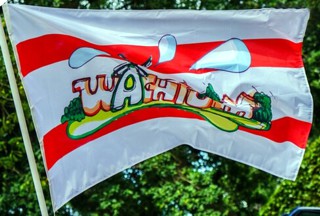 image located by Valentin Poposki, 16 December 2023
image located by Valentin Poposki, 16 December 2023
https://coevordernieuws.nl/nieuws/wachtum-maakt-er-een-sportief-feest-van/
https://www.samendalen.nl/nieuws/voetbal-en-feest-in-wachtum/
The flag was described as "brand new" in September 2019. It alternates white and red horizontal stripes approximately 1-1-2-1-1, with the village logo superimposed.
Valentin Poposki, 16 December 2023
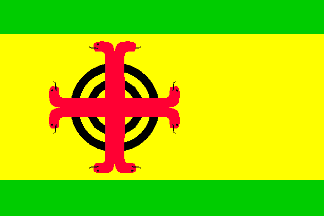 Shipmate Flagchart : http://www.flagchart.net
Shipmate Flagchart : http://www.flagchart.net
The municipal flag was designed by J. F. van Heijningen in Utrecht.
Granted by decree of the High Council of Nobility on 26 July 1988 #88/242-28.
The flag has been adopted as official municipal flag on 14 November 1988.
Description:
Three horizontal stripes green-yellow-green related 1:4:1 with on the
yellow stripe at 1/3 flaglenth two black concentric circles, each wide
about 7/200 of the total height of the flag; the rings with external diameters
of respectively 80/200 and 52/200 of the height of the flag and on it a
red, double cross of snakeheads with arms, of which the width is equal
to 9/100 of the flagheight and a total height, which is equal to 3/5 flagheight.
Explanation:
The yellow stripe with rings and cross mirror exactly the municipal
arms. The coat of arms has been shifted a little to the hoist. They symbolize the
word 'LOO', meaning 'WOOD'. Zweeloo is situated in a beautiful wooded region.
To maintain the balance in the flag a green stripe has been added to the
top and the bottom. In that way the location of Zweeloo in a wooded area
has been expressed. The flag has been officially unveiled on 20 May 1989
by the Mayor, Mr. J. Jonkers.
Additional info from Kl. Sierksma's 'De gemeentewapens van Nederland',
1968:
'The double ring reminds of the ringurnfield near the 'Galgenberg'
(Gallow mountain). The snakehead-cross is a symbol for the early settlement
of Christianity in this region, which was then still a very rough country.'
The Coat of Arms and flag can also be seen at Ralf Hartemink's BNG-site:
http://www.bng.nl/ngw/z/zweelo.htm
With the following (IMHO better) explanation of the snakeheadcross:
'The cross in the Coat of Arms symbolizes Christianity, which arrived here
quite early. A snakehead-cross was chosen to symbolize the marshy condition
of the soil.'
Jarig Bakker, 2 August 1999.
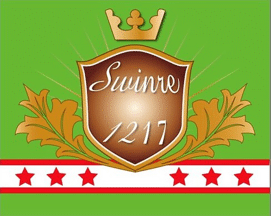 image located by Valentin Poposki, 16 December 2023
image located by Valentin Poposki, 16 December 2023
https://www.facebook.com/Zwinderen/photos
https://pbzwinderen.nl/swinre-805-jaar/
The flag was designed for the 800th anniversary of Zwinderen by Zeilmakerij de Pelle v.o.f. The flag is described as "timeless" and can be used on all occasions.
It is green with a red-edged horizontal white bar near the bottom, bearing six red stars in two groups 3 and 3. On the flag is a brown shield, fading to white in the center, with the words Swinre 1217 in a scripted format, with oak leaves on either side and simple crown above.
Valentin Poposki, 16 December 2023